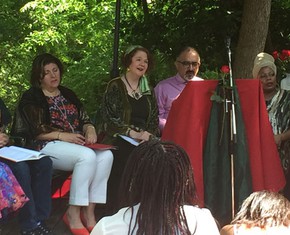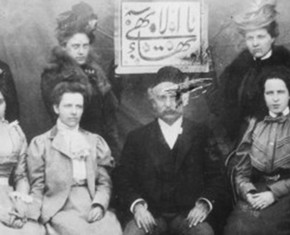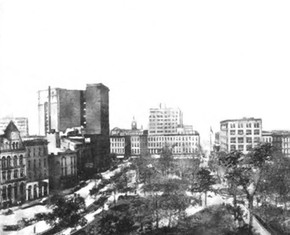The views expressed in our content reflect individual perspectives and do not represent the authoritative views of the Baha'i Faith.
When we hear a new name for the first time, it’s often hard to remember exactly. Even more so, if the name is unfamiliar. All the more, if foreign. Still more, if trying spell that new name correctly.
It can be worse still, if two or more persons are trying spell that new foreign name correctly and consistently – even if those two people are professionally trained and experienced journalists, schooled in reporting information as accurately as possible. So it is not surprising that the mass media sometimes gets those spellings wrong. Especially the print press 100 years ago, back in 1920 and 1921, for instance.
RELATED: Harlem, 1920: An Entire Black Church Embraces the Baha’i Faith
You can see a good example of this confusion in news reports regarding a Persian Baha’i teacher known as Aqa Mirza Asadu’llah-i-Mazindarani or Jinab-i-Fadil-i-Mazandarani, a Baha’i who Abdu’l-Baha sent to America in April 1920. Abdu’l-Baha sent Mazandarani to the United States with this mission: “The duty of his honor Fazel, is to travel in all parts of America and raise the call of the Kingdom of Abha in all the meetings, churches and gatherings.”
(The Arabic word “Abha” is the superlative form of the root word “Baha,” which means splendor, light, and glory. In the Baha’i writings, the “Kingdom of Abha” denotes heaven.)
In Part 70 of this series, Fazel Mazandarani was first mentioned, and in Part 71, we noted that The Washington Bee, an influential African American newspaper, reported that “Jeniba Fazel Manzandarani” was touring the country as a Baha’i speaker “on the Chautauqua circuit,” accompanied by “Mr. William H. Randall, of Boston, prominent in the world of business and also a Bahai teacher” where “the great [Baha’i] message reached about fifteen thousand souls” in and around “Chautauqua, Roycroft and a few other places.” “During the fall and winter” of late 1920 and early 1921, the newspaper reported that “Mirza Fazel” would “tour the Western and Southern States.”
Another African American newspaper, The New York Age, had earlier reported that “Prince Fazel Mazandrani,” (same person, different spelling) who was invited by the Rev. Richard M. Bolden as a guest speaker in his Harlem church, “delivered an address in Persian which was translated into English” and who was “making a tour of the continent preaching and teaching ‘Universal Love’.”
So who was this man, Jinab-i-Fadil Mazandarani, whose name was so hard to spell for American reporters, the Persian Baha’i speaker and scholar Abdu’l-Baha sent to America? This is what Abdu’l-Baha himself had to say about Fazel in two separate letters he wrote to American Baha’is:
His honor Fazel, in reality, is perfect in all the grades — in knowledge and virtue, in sincerity of intention, in beauty of character, in severance from aught else save God and attraction with the fragrances of God.
His honor Fazel is a revered person. He has been growing for a long time in the Cause. Next to his honor, Mirza Abul Fazl, he is the best informed of his contemporaries. He has no aspiration save service to the Cause of God. He is a scholar, he is appreciative and grateful to thee.
Prior to coming to America, in 1909, while en route to Arabia at the request of Abdu’l-Baha, Fazel suffered greatly for his belief in the Baha’i Faith. He was arrested and imprisoned in Najaf, and then again in Karbala, in the course of being exiled to Baghdad, and finally returned to Tehran. While being taken to Baghdad, Fazel recalled:
It took us four days to cover the distance from Karbala to Baghdad and during these four days I was riding a donkey with my hands in these locks. It was during the summer and the heat was unendurable. The donkeys were so tired that often they would not walk any longer but would become unruly and throw me down on the ground. My hands were tied and I did not know what to do. The muleteer was rather fanatical and whenever I fell down from the donkey he would come and kick me with his foot and say, “Oh you ignorant man why don’t you get up and ride on your donkey?” It happened that sometimes sixteen or seventeen times I fell down from the donkey and they had to come and put me again on its back.
Fazel traveled to Egypt in 1910–1911, where he met Abdu’l-Baha. He then proceeded to India and Burma to proclaim and promote the universal principles of the Baha’i Faith, with its socially progressive teachings that, if put into practice, would advance societies around the world and would thereby contribute greatly to the advancement of civilization. Fazel journeyed throughout North America twice, first in 1920–1921, at the request of Abdu’l-Baha, and again in 1923–1925, as directed by Shoghi Effendi, the Guardian of the Baha’i Faith and its leader after Abdu’l-Baha’s passing. In 1928, Fazel traversed throughout Caucasia and Turkmenistan, besides his travels throughout Persia on many occasions.
“Fazel is best known for his literary output,” writes Moojan Momen, in his Encyclopedia Iranica article, which lists Fazel’s major written works.
RELATED: Harlem’s First Emmanuel Church and the Baha’i Principle of Racial Unity
What did a Persian man have to say to Americans trying to rid their country of its virulent racism? This remarkable man, “Mirza Fazel” or “Prince Fazel” as the newspapers called him, had some fascinating insights into Harlem’s First Emmanuel Church, its racially diverse “Rainbow Circle,” and the Baha’is who were actively involved in that early civil and human rights effort in Harlem. In an unpublished manuscript rediscovered in 1994 by Baha’i scholars Richard Hollinger and Peter Terry, Fazel spoke to an African American A.M.E. church congregation in Philadelphia, Pennsylvania, recalling the following:
When I arrived in New York last year, I found these Baha’is, who are the followers of Abdu’l-Baha, forming a circle, forming a society in Harlem, in the church of Reverend Bolden, a very progressive, colored minister. The society was called the Rainbow Circle, because this society had the all-inclusive principle of bringing all the races together; the white, the colored, the Persian, the Chinese, the Syrian, the Japanese etc.; all used to come together and sit side by side, and once a month they had an international dinner.
We don’t know what Fazel taught the Christian and Baha’i faithful at the First Emmanuel Church in Harlem, but his message was probably quite similar to this Baha’i-inspired message he gave to those gathered at the A.M.E. church in Philadelphia:
The white and the colored, the yellow and the red, Persia and the United States, China and France — these distinctions are in the minds of men; these are the things that we, as human, ignorant, finite beings raise as barriers; we give so much importance to them. But when you go into the Kingdom of God, when you stand in the presence of the Lord, there is no distinction of color, race, country; they are all one in His estimation, and everything is equal in his sight. Thus in the sight of God there is no color. There is only one color which He takes as most important and that is the color of service, the color of love. If we have that color then we are beloved in His sight. God does not look upon color at all; He looks upon the hearts of His servants.
Of “Prince Fazel” and his Baha’i advocacy of the unification of the races in America, Shoghi Effendi later wrote:
The beneficent services and unremitting labors of that selfless and able teacher of the Cause of God, Jinab-i-Fadil-i-Mazandarani, the details of whose travels and activities I have followed with deep interest, have been to me a constant source of hope and real encouragement, and my hope is that the seeds he has so wisely sown may with your support yield in the not distant future an abundant harvest.

















Comments
Sign in or create an account
Continue with Googleor